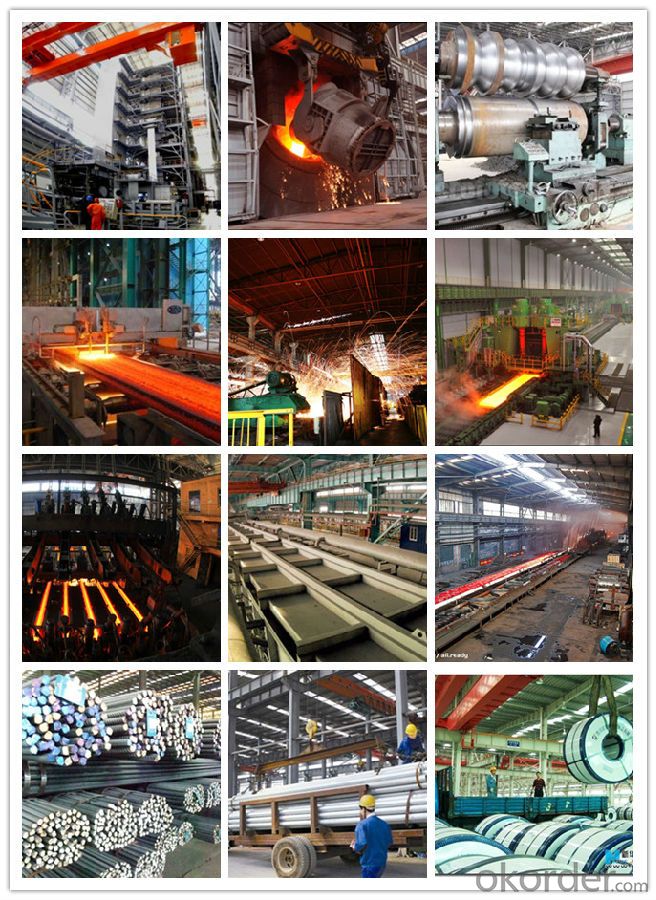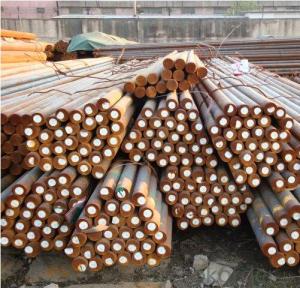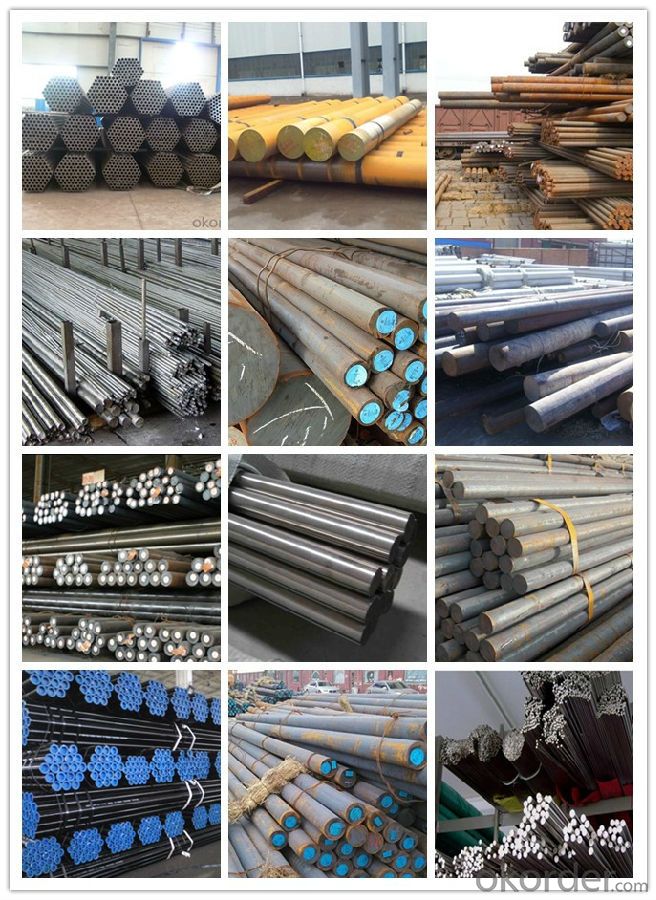Special Steel SAE8620 Alloy Structual Steel Round
- Loading Port:
- China main port
- Payment Terms:
- TT OR LC
- Min Order Qty:
- 30 m.t.
- Supply Capability:
- 10000 m.t./month
OKorder Service Pledge
OKorder Financial Service
You Might Also Like
Item specifice
Specifications
8620 steel round bars
1.Diameter:12~600mm
2.Delivery Conditon:annealed, black/turned surface
3.Short Delivery Time
Product information
| AISI 8620 steel flats | |||||||
| Chemical Composition(%) | |||||||
| C | Si | Mn | P | S | Cr | Mo | Ni |
| 0.38-0.43 | 0.15-0.35 | 0.60-0.80 | ≤0.030 | ≤0.030 | 0.70-0.90 | 0.20-0.30 | 1.65-2.00 |
| Heat Treatment | |||||||
| annealed, Q+T | |||||||
| Melting Process | |||||||
| 1. EAF: Electric Furnace+LF+VD(Optional) | |||||||
| 2. ESR: Electric Furnace+LF+VD+Eleroslag Remelted(Optional) | |||||||
| UT Class | |||||||
| According to Standard of SEP 1921/84,100% Volume, Level C/c, D/d or E/e | |||||||
| Tolerance on Quantity | |||||||
| +/-10% Per Size | |||||||
Product show
Workshop show

Shipping
1. FedEx/DHL/UPS/TNT for samples, Door-to-Door;
2. By Air or by Sea for batch goods, for FCL; Airport/ Port receiving;
3. Customers specifying freight forwarders or negotiable shipping methods!
Delivery Time: 3-7 days for samples; 5-25 days for batch goods.
Payment Terms
1.Payment: T/T, L/C, Western Union, MoneyGram,PayPal; 30% deposits; 70% balance before delivery.
2.MOQ: 1pcs
3.Warranty : 3 years
4.Package Informations: 1) EXPORT, In 20 feet (GW 25 ton) or 40 feet Container (GW 25 ton)
2)as customer's requirement
Why choose us?
(1) The leading exporter in China special steel industry.
(2) Large stocks for various sizes, fast delivery date.
(3) Good business relationship with China famous factories.
(4) More than 7 years steel exporting experience.
(5) Good after-sales service guarantee.
- Q:Can special steel be used in the production of fasteners for high-stress applications?
- Yes, special steel can be used in the production of fasteners for high-stress applications. Special steels, such as alloy steels or stainless steels, possess enhanced mechanical properties, corrosion resistance, and high tensile strength, making them suitable for demanding and high-stress environments. These types of steel are often utilized in industries such as aerospace, automotive, and construction, where fasteners must withstand heavy loads and extreme conditions.
- Q:How does special steel contribute to the aerospace racing aftermarket industry?
- Special steel plays a crucial role in the aerospace racing aftermarket industry by offering superior strength, durability, and corrosion resistance properties. It is used in the manufacturing of various aircraft components, such as engine parts, landing gear, and structural elements, ensuring high performance and safety standards. The use of special steel in this industry allows for lighter and more efficient aircraft designs, enhancing speed and fuel efficiency. Additionally, special steel's resistance to extreme temperatures and stress makes it ideal for aerospace applications, contributing to the overall reliability and longevity of aftermarket products.
- Q:What are the properties of silicon steel?
- Silicon steel, also known as electrical steel or transformer steel, is a type of steel alloy that contains silicon as its main additional element. It possesses several distinct properties that make it suitable for specific applications. Silicon steel displays high electrical resistivity, low coercivity, and low core losses, making it an excellent material for electrical transformers, motors, and generators. It also exhibits good magnetic properties, such as high permeability and low hysteresis loss, enabling efficient energy conversion and improved efficiency in electrical devices. Additionally, silicon steel has good mechanical strength, corrosion resistance, and thermal stability, making it a durable and reliable material in various industrial applications.
- Q:How does special steel contribute to the strength of products?
- Special steel plays a significant role in enhancing the strength of products in multiple ways. To begin with, engineers design special steel to possess improved mechanical properties, including high tensile strength, toughness, and hardness. These qualities make it particularly suitable for industries such as construction, automotive manufacturing, and aerospace engineering where strength is of utmost importance. Furthermore, special steel can be customized to meet specific requirements, allowing manufacturers to adjust its composition and properties to suit their products. This adaptability guarantees that the steel utilized in different components is optimized for utmost strength, durability, and performance. Additionally, special steel undergoes various heat treatment processes like quenching and tempering, which further bolster its strength. These treatments modify the steel's microstructure, resulting in enhanced hardness and resistance to wear and fatigue. Consequently, products made from special steel can endure heavy loads, harsh environments, and repetitive stress, ensuring their long-term reliability and durability. Moreover, special steel often exhibits remarkable corrosion resistance, making it well-suited for applications exposed to corrosive environments such as the marine or chemical industries. By preventing material degradation, corrosion resistance enhances the overall strength and lifespan of the product. In conclusion, special steel contributes significantly to product strength through its enhanced mechanical properties, customizable composition, heat treatment processes, and corrosion resistance. These factors collectively ensure that products made from special steel can withstand high stress, extreme conditions, and deliver exceptional performance, making them indispensable in various industries.
- Q:How does special steel ensure product reliability?
- Special steel ensures product reliability through its unique properties and manufacturing processes. Special steel is designed to have exceptional strength, durability, and resistance to corrosion, wear, and fatigue. These enhanced properties make it suitable for various critical applications where reliability is paramount, such as in automotive, aerospace, energy, and infrastructure industries. Special steel undergoes rigorous quality control measures during its production to ensure consistency and adherence to specific standards. This helps in minimizing variations and defects, ensuring that the final product meets the required specifications and performs reliably under challenging conditions. Additionally, special steel's ability to be tailored and customized enables manufacturers to create products that are precisely engineered to withstand specific operating environments, further enhancing their reliability.
- Q:What are the different methods of surface passivation for special steel?
- Surface passivation methods for special steel vary in order to enhance its corrosion resistance and overall performance. One popular approach is chemical passivation, where a protective coating is applied to the steel's surface. This coating, composed of substances like chromium oxide or nitric acid, is typically formed through a chemical reaction that creates a protective layer. Chemical passivation is commonly used in industries where the steel is exposed to corrosive environments, such as marine or chemical applications. Another method is mechanical passivation, which involves physically altering the steel's surface to create a protective barrier. This can be achieved through techniques like shot peening or sandblasting, which create a roughened surface that is less prone to corrosion. Mechanical passivation is often employed in situations where the steel is exposed to abrasive or erosive conditions, such as mining or oil drilling. Electrochemical passivation is yet another technique used to passivate special steel surfaces. It entails using an electric current to generate a protective oxide layer on the steel's surface. Processes like electrochemical polishing or anodizing achieve this controlled oxidation. Electrochemical passivation is frequently utilized in industries where the steel is subjected to high temperatures or aggressive chemical environments. Additionally, specialized surface treatments, like plasma or laser surface passivation, are available for special steel. These methods utilize concentrated energy sources to modify the steel's surface and create a protective layer that enhances its corrosion resistance and mechanical properties. Such treatments are typically applied in high-performance applications, such as the aerospace or automotive industries. Ultimately, the choice of surface passivation method for special steel depends on the specific requirements of the application and the desired performance characteristics of the material. Each method has its own advantages and limitations, and factors like cost, time, and environmental impact should be considered when selecting the most suitable method for a particular application.
- Q:Can special steel be used for cutting tools?
- Yes, special steel can be used for cutting tools. Special steel, such as high-speed steel or tool steel, is specifically designed to have superior hardness, strength, and toughness, making it ideal for cutting applications. These steels can retain their sharpness and withstand high temperatures and mechanical stress, resulting in efficient and durable cutting tools.
- Q:How does special steel perform in impact loading conditions?
- Known for its exceptional performance in impact loading conditions, special steel possesses remarkable strength, toughness, and resistance to deformation, thanks to its unique composition and manufacturing process. By effectively absorbing and dissipating energy, special steel minimizes the risk of catastrophic failure or damage when subjected to impact loading. The high strength of special steel enables it to withstand high impact forces without experiencing significant deformation or fracture, making it particularly suitable for applications where impact loading is prevalent, such as in the construction of heavy machinery, automotive components, and structural elements. In addition to its strength, special steel's toughness plays a crucial role in its performance during impact loading conditions. With excellent fracture toughness, special steel can resist crack propagation and absorb impact energy without fracturing, ensuring that it can withstand sudden and severe impacts without compromising its structural integrity. Furthermore, special steel is often subjected to treatments that enhance its resistance to impact loading conditions. Processes like heat treatment, forging, and quenching and tempering can increase the material's hardness and strength, further improving its ability to withstand impact forces. To summarize, special steel excels in impact loading conditions due to its high strength, toughness, and resistance to deformation. Its efficient energy absorption and dissipation, coupled with its resistance to fracture, make it an ideal choice for applications where impact loading is a concern.
- Q:How does special steel resist wear and abrasion?
- Special steel resists wear and abrasion due to its unique composition and manufacturing process. It is typically made from alloys with high levels of carbon, chromium, and other elements that enhance its hardness and strength. The addition of these elements creates a microstructure within the steel that is highly resistant to wear and abrasion. Additionally, special steel can be heat-treated to further increase its hardness and toughness, making it more resilient against the forces that cause wear and abrasion. Overall, the combination of alloying elements and heat treatment gives special steel its exceptional ability to resist wear and abrasion in various applications.
- Q:What are the requirements for special steel used in transportation equipment manufacturing?
- The requirements for special steel used in transportation equipment manufacturing typically include high strength and durability, excellent corrosion resistance, good weldability and formability, as well as the ability to withstand extreme temperatures and mechanical stress. Additionally, the steel should possess specific properties such as low weight, high impact resistance, and resistance to fatigue and wear. Compliance with industry standards and regulations is also crucial to ensure the safety and reliability of transportation equipment.
1. Manufacturer Overview |
|
|---|---|
| Location | |
| Year Established | |
| Annual Output Value | |
| Main Markets | |
| Company Certifications | |
2. Manufacturer Certificates |
|
|---|---|
| a) Certification Name | |
| Range | |
| Reference | |
| Validity Period | |
3. Manufacturer Capability |
|
|---|---|
| a)Trade Capacity | |
| Nearest Port | |
| Export Percentage | |
| No.of Employees in Trade Department | |
| Language Spoken: | |
| b)Factory Information | |
| Factory Size: | |
| No. of Production Lines | |
| Contract Manufacturing | |
| Product Price Range | |
Send your message to us
Special Steel SAE8620 Alloy Structual Steel Round
- Loading Port:
- China main port
- Payment Terms:
- TT OR LC
- Min Order Qty:
- 30 m.t.
- Supply Capability:
- 10000 m.t./month
OKorder Service Pledge
OKorder Financial Service
Similar products
New products
Hot products
Related keywords































